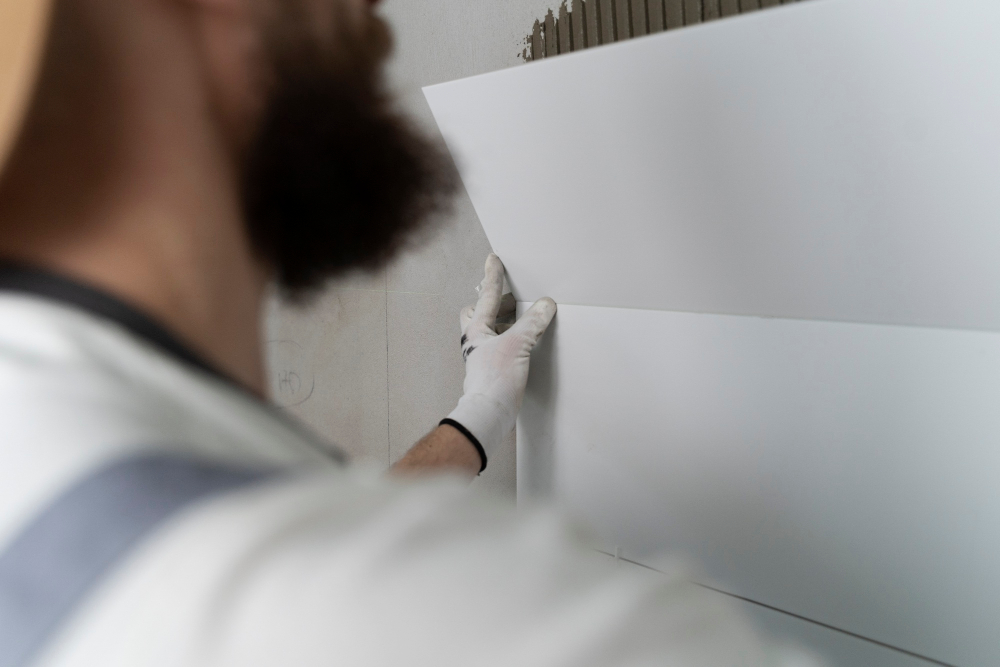What is Gypsum Board - Gypsum Board Types & Applications

What is Gypsum Board?
Gypsum board, also known as drywall or plasterboard, is a building material used for walls and ceilings. It is made of a gypsum core sandwiched between two sheets of paper and is known for its fire resistance, sound insulation properties, and ease of installation. It is commonly used in residential and commercial construction due to its practical applications and various uses.
In this blog, we will dive deep into the world of gypsum boards. From understanding what they are and how they are made to exploring their various uses and benefits, we'll cover it all. Whether you're a homeowner, contractor, or just curious about this versatile building material, you're sure to learn something new. So, let's get started!
What is Gypsum Board Material?
Gypsum board, also known as drywall, is a panel made of gypsum plaster pressed between two thick sheets of paper. It is commonly used in construction as a wall or ceiling material due to its ease of installation, fire resistance, and soundproofing qualities.
What is Gypsum Board made of?
Gypsum boards are made by crushing and grinding gypsum rock into a fine powder, which is then mixed with water to form a slurry. The slurry is then poured onto a sheet of paper and sandwiched between two more sheets of paper to form a board. The board is then dried to remove excess moisture and cut to the desired size.
Types of Gypsum Board
There are several types of gypsum board, including:
- Regular gypsum board: Used for most interior walls and ceilings.
- Moisture-resistant gypsum board: Great for humid areas like bathrooms and kitchens.
- Fire-resistant gypsum board: Ideal for areas requiring fire protection, such as garages and utility rooms.
- Impact-resistant gypsum board: Best for high-traffic areas and locations prone to impact, such as hallways and stairwells.
Each type of gypsum board has unique features that make it suitable for specific applications. Regular gypsum board is the most commonly used type, while moisture-resistant, fire-resistant, and impact-resistant gypsum boards have properties that make them ideal for specialized purposes.
Properties & Applications of Gypsum Board
Properties of Gypsum Board
- Fire-resistant: It is a non-combustible material that can withstand high temperatures, making it ideal for fire-resistant walls and ceilings.
- Soundproofing: It has good sound insulation properties, making it useful for soundproofing walls and ceilings.
- Easy to install: It is lightweight and easy to cut, making it easy to install and finish.
Applications of Gypsum Board
- Interior walls and ceilings: It is commonly used for interior walls and ceilings in residential and commercial buildings.
- Fire-resistant walls: It is used in fire-rated walls to prevent the spread of fires.
- Soundproofing: It is used to soundproof walls and ceilings in recording studios, theaters, and other spaces where sound quality is important.
- Decorative finishes: It can be finished with paint, wallpaper, or other decorative finishes to create a polished look.
Overall, drywall or gypsum board is a versatile and practical material that is widely used in the construction industry for its fire-resistant and soundproofing properties, as well as its ease of installation and finishing.
What is the Purpose of Gypsum Board?
Gypsum board is used as a construction material to create walls and ceilings. It provides a smooth and flat surface that can be easily painted or decorated. Additionally, it is fire-resistant and has excellent soundproofing and insulating qualities.
What Happens When Gypsum Board Gets Wet?
When gypsum board or plasterboard gets wet, it can become weakened, swollen, and discolored. Over time, if not properly dried and treated, it can also lead to the growth of mold and mildew, which can be harmful to health. It is important to promptly address any water damage that happens to gypsum board to prevent further damage and potential health hazards.
How Many Years Does Gypsum Board Last?
Gypsum board, also known as drywall, can last for several decades if it is installed and maintained properly. Its lifespan can vary depending on factors such as humidity, temperature, and exposure to water and moisture. However, on average, gypsum boards can last for 50 years or more.
Advantages of Gypsum Board
The best gypsum board or drywall makes for a consistent and organic building material. It has a lot of applications and uses due to several advantages.
1. Easy to Install
Gypsum board is easy to cut, fit, and install, making it a popular choice for construction projects.
2. Fire-resistant
Gypsum board has a high resistance to fire, making it a safe option for buildings.
3. Soundproofing
Gypsum board can help to reduce noise transmission between rooms or floors.
4. Moisture-resistant
Some types of gypsum board are designed to be moisture-resistant, making them suitable for use in areas with high humidity or moisture, such as bathrooms or kitchens.
5. Versatile
Gypsum board can be used for a variety of applications, including walls, ceilings, and partitions.
Overall, gypsum board is a durable, cost-effective, and versatile building material with several advantages for construction projects.
Gypsum Board Disadvantages
Some disadvantages of gypsum board include its vulnerability to water damage, susceptibility to cracking and breaking under stress, and difficulty in repairing larger holes or damages. Additionally, it can emit harmful gases when exposed to fire.
Uses of Gypsum Board
Gypsum board is used as a building material for walls, ceilings, and partitions. It is also used for fire-resistant constructions, sound insulation, and decorative finishes. Additionally, it is widely used in the construction industry due to its affordability, ease of installation, and fire-resistant properties.
Is Gypsum Board Waterproof?
No, gypsum boards are not waterproof. They can be damaged by prolonged exposure to water or moisture. However, there are types of gypsum board that are moisture-resistant and can be used in areas with higher humidity levels, such as bathrooms and kitchens.
Can Gypsum Board Hold a TV?
Yes, gypsum board, also known as drywall, can hold a TV as long as it is properly anchored to the wall studs with appropriate hardware. It is important to make sure the weight of the TV doesn't exceed the weight limit of the anchors and that they are installed securely. It is always recommended to consult with a professional if you are unsure about the installation process.
Conclusion
In conclusion, gypsum board is a versatile and useful building material that has numerous applications in the construction industry. From interior walls and ceilings to fire-resistant barriers and soundproofing, gypsum board offers a range of benefits and advantages. Its versatility, durability, and affordability make it a popular choice for both residential and commercial projects. As we continue to innovate and improve upon building materials, gypsum board will undoubtedly continue to play an important role in the construction industry for years to come.




